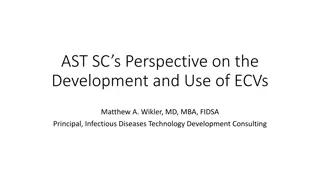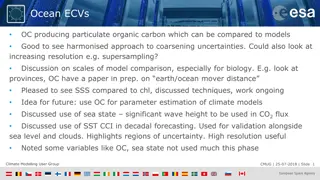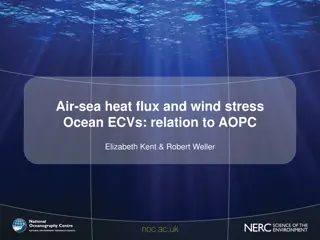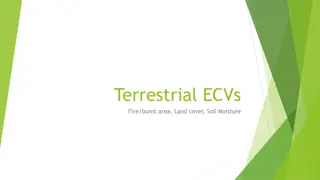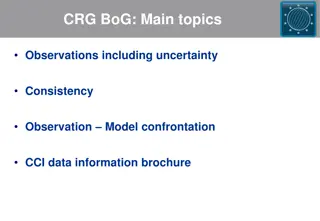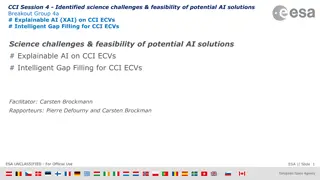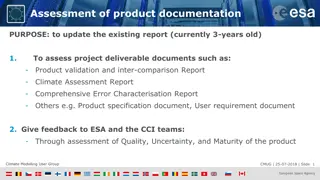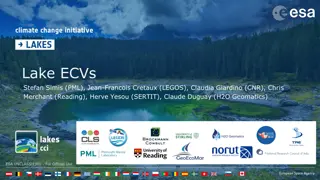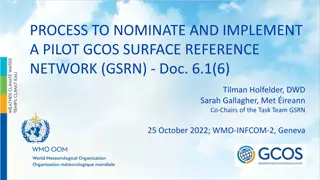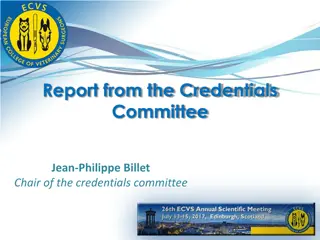FDA Perspective on Epidemiological Cut-off Values (ECVs)
The FDA presents insights on the development and use of Epidemiological Cut-off Values (ECVs) to distinguish wild-type populations from those with acquired resistance mechanisms. ECVs are crucial for determining antimicrobial susceptibility and guiding treatment decisions. The process involves analy
0 views • 13 slides
Overview of Epidemiological Cutoff Values (ECVs) in Antimicrobial Susceptibility Testing
Epidemiological Cutoff Values (ECVs) are crucial in determining antimicrobial susceptibility by distinguishing wild-type and non-wild-type microbial populations. ECVs are defined based on factors like minimal inhibitory concentration (MIC) and genetic variation, and are determined through specific m
0 views • 16 slides
Understanding Essential Climate Variables (ECV) and Their Requirements
Essential Climate Variables (ECVs) are physical, chemical, or biological variables crucial for characterizing Earth's climate. They provide empirical evidence for climate understanding, prediction, risk assessment, and more. ECVs must be relevant, feasible, and cost-effective, not as stand-alone var
0 views • 14 slides
Insights from Climate Modelling User Group Meeting - July 2018
Discussion at the Climate Modelling User Group meeting highlighted the use of Ocean ECVs, with a focus on organic carbon production and model comparisons. Key topics included increasing resolution, biogeochemistry predictions, and validation using OC CCI data. Various WP projects were also discussed
1 views • 4 slides
An Ocean of Opportunity: Exploring Ocean Observing at Conference OceanObs 19
Discover the latest insights on air-sea heat flux, wind stress, and atmospheric ECVs at the OceanObs 19 conference in Hawaii. Engage with 1200 ocean observing scientists, program managers, and policy experts to chart the next decade of ocean observing and enhance international collaboration on ocean
1 views • 16 slides
Terrestrial ECVs: Fire, Land Cover, Soil Moisture Overview
Detailed examination of Terrestrial Essential Climate Variables (ECVs) focusing on fire monitoring, land cover analysis, and soil moisture assessment. The information encompasses product summaries, error characterization methods, outreach efforts, user statistics, planned activities for phase 2, and
0 views • 8 slides
CRG.BoG Main Topics: Observations & Consistency in Climate Studies
This document discusses observations, data continuity, validation methods, and consistency in climate studies. It touches on using available instruments, addressing data gap issues, lack of ground-based observations, and ensuring consistency between different Essential Climate Variables (ECVs). Vari
0 views • 8 slides
Challenges and Feasibility of Explainable AI and Gap Filling for CCI ECVs
Explainable AI (XAI) addresses the need for human-understandable AI models, contrasting with black box approaches. Intelligent gap filling for CCI ECV data is crucial but lacks efficient methods. Machine Learning can enhance EO data analysis with XAI insights, necessitating collaboration between dom
0 views • 8 slides
Assessment of Product Documentation for Climate Modelling User Group
Conducting an assessment to update the existing report on project deliverable documents, including product validation, inter-comparison reports, and error characterization. Providing feedback to ESA and CCI teams on the quality, uncertainty, and maturity of the product documentation related to vario
0 views • 8 slides
Understanding the Importance of Lakes in Climate Change Research
Lakes play a crucial role as integrators of catchment change and sentinels of climate change. With millions of lakes worldwide, they provide essential ecosystem services and have high cultural value. The Lake ECVs project aims to establish a consistent time-series of lake data using various instrume
0 views • 11 slides
Establishment of GCOS Surface Reference Network (GSRN) Pilot Phase
The establishment of the GCOS Surface Reference Network (GSRN) Pilot Phase aims to improve the accuracy, stability, and comparability of surface observations for Essential Climate Variables (ECVs). The GSRN will serve as the reference network for surface observations, providing data traceability and
0 views • 7 slides
Annual Report and Credentials Process Overview
The report from the Credentials Committee chaired by Jean-Philippe Billet highlights key committee members, deadlines for submissions, and statistics on credentials applications and annual reports. The document also provides insights into the recertification committee, responsibilities of program di
0 views • 23 slides

